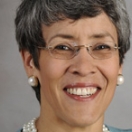

Susan Pachero is being honored as a Champion of Change for her work on the front lines to protect public health in a changing climate.
As a pediatrician, I thought I’d never find anything as fulfilling and joyful as taking care of children. I am now overcome by an overwhelming sense of responsibility to protect and inform my patients and their families about the real effects of climate change on their health.
In 2006, I took my children to watch the documentary An Inconvenient Truth as part of their school homework. I remember my hesitance. I was obviously aware of climate change, but it had always seemed distant. The soundtrack from Melissa Etheridge’s song “I Need to Wake up" still runs through my mind. So does the closing message: “Write to Congress, and if they do not listen, run for Congress.” I remember my children’s passionate response, and it still brings a smile to my heart.
I started as a volunteer for the Climate Reality Project, later became a Climate Reality mentor and then a district manager for the organization’s efforts in Puerto Rico. I led volunteers to share the climate story with anybody willing to listen.
I remember a few close friends, patients, and colleagues sharing their concern of “losing me to this climate thing.” I disagreed. As a physician, I am committed to the art of healing. I have to approach anything and everything that may affect my patient’s mental or physical well-being. The reality is that climate change will affect generations to come. I have the responsibility to share knowledge on the challenges we face as a society-- particularly when there is a chance for harm to the health and security of vulnerable people.
I give talks as a Climate Leader with the Climate Reality Project to help fill the knowledge gap on climate change. I have geared my efforts not only to engage the general public, but also to target individuals and groups involved in health care. As health care providers, we are trusted advocates and messengers. I have found that even in the Texas Medical Center, among the largest in the world, knowledge regarding the health dangers related to a changing climate is limited.
I work as a representative for the Puerto Rico Climate Change Council, working with Puerto Rico’s Enlace Latino de Accion Climática, sponsored by El Puente Community Group for Peace and Justice, and I participated as a representative and author for Puerto Rico’s “National Climate Assessment - Southeast Region-Health Sector Report (2012).” I currently work with the American Academy of Pediatrics and am a co-author of a position statement on the need to acknowledge the harmful effects climate change has on American children. Additionally, I lead an effort with the American Lung Association Plains-Gulf Region in Houston to release a statement regarding the changing climate in our state and the need to “fight for the air.” In consultation with Dr. Ronald A. Sass from the James A. Baker III Institute for Public Policy at Rice University in Houston, I am forming a coalition of individuals with diverse backgrounds, among them health care, , faith groups, student organizations, academics, scientific fields, and local community representatives, who openly acknowledge the need to engage our communities in open discussions that will facilitate the implementation of climate mitigation and adaptation strategies for the state of Texas.
As a physician, my role in promoting health extends beyond my interaction with patients in the office. I have the responsibility to help restore balance in the lives of my patients and try to make a difference for all Americans. I cannot do anything less for our planet.
Susan Pachero is an Associate Professor at the University of Texas Health Science Center.


